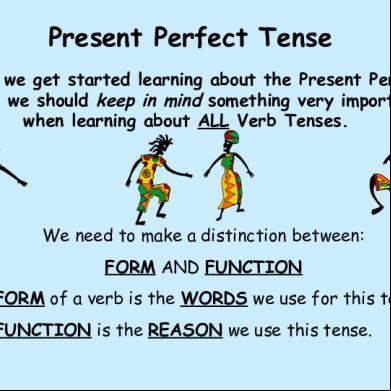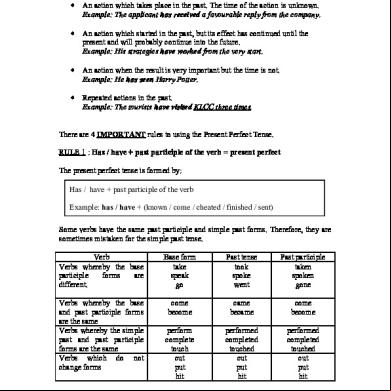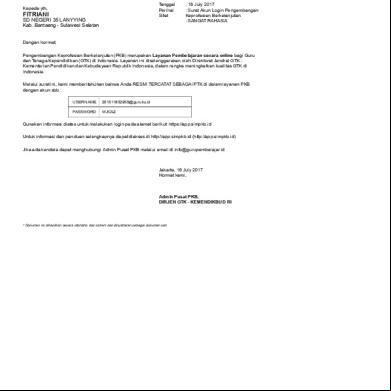Ppt Present Perfect Tense 2zq46
This document was ed by and they confirmed that they have the permission to share it. If you are author or own the copyright of this book, please report to us by using this report form. Report 3l3c15
Overview 3z723u
& View Ppt Present Perfect Tense as PDF for free.
More details 2i4a6q
- Words: 585
- Pages: 10
Present Perfect Tense Before we get started learning about the Present Perfect Tense, we should keep in mind something very important when learning about ALL Verb Tenses.
We need to make a distinction between: FORM AND FUNCTION The FORM of a verb is the WORDS we use for this tense. The FUNCTION is the REASON we use this tense.
So…let’s talk about the FORM of the PRESENT PERFECT TENSE first…OK? The Present Perfect Tense is formed by 2 things: •
the auxiliary verb HAVE and HAS
•
the PAST PARTICIPLE
For Example… She has worked in that office for six years.
auxiliary
past participle
Here are some more examples! I have already eaten breakfast. She has seen that movie before. We have dealt with customers for many years.
She has used a cash before. He has worked for that company since May. We have already served their food.
In these examples the past participle has an irregular form. Just like the lists you’ve been studying
In these examples the past participle has a regular form and looks just the the simple past tense, but it’s not.
We often use CONTRACTIONS with this tense. I have
I’ve
You have
You’ve
We have
We’ve
They have
They’ve
He has
He’s
She has
She’s
It has
It’s
I have lived in Florida for two years. I’ve lived in Florida for two years
So now that we’ve talked about the form (words) of the PRESENT PERFECT, we can now look at the reasons (function) we use it and see in what situations we need it. There are 2 main reasons we use the PRESENT PERFECT TENSE. They are completely different and have no connection to one another.
Do you want to guess?
Are you Ready? Reason #1
We use the PRESENT PERFECT TENSE to talk about a completed past action at an unspecified time in the past. Perhaps we don’t when the action happened. Maybe we don’t know when the action happened. Or we just don’t care when the action happened. The only thing that is important is that it happened sometime before now. But not any specific time. I’ve already eaten breakfast. She’s seen that movie before.
When did it happen?
When we want to ask a question about something that happened at any time before now, we say:
Have you ever….?
Have you ever worked at a job you really loved? Has she ever worked at a job she really hated? Have they ever used a cash ? Have you ever supervised other employees?
The short answer is… Yes, I have.
Yes, she has.
No, I haven’t
No, she hasn’t.
If we want to ask a question about something that happened at a specific time in the past, we wouldn’t use the present perfect tense. We need to use a different tense. Can you guess which one? You’re right! The simple past tense. When did they use a cash ? They used a cash last year. When did you supervise other people? I supervised other people two years ago. Last year, yesterday, two years ago, last week are all words we use with the simple past tense
Often when we’re speaking, we go back and forth between these two tenses—the present perfect and the simple past tense. Take a look at this example. Miko: Have you ever supervised other people? Tanaya: Yes, I have. Miko
Tanaya
Miko: When did you do that? Tanaya: I supervised others last year in my previous job.
LET’S PRACTICE!
We need to make a distinction between: FORM AND FUNCTION The FORM of a verb is the WORDS we use for this tense. The FUNCTION is the REASON we use this tense.
So…let’s talk about the FORM of the PRESENT PERFECT TENSE first…OK? The Present Perfect Tense is formed by 2 things: •
the auxiliary verb HAVE and HAS
•
the PAST PARTICIPLE
For Example… She has worked in that office for six years.
auxiliary
past participle
Here are some more examples! I have already eaten breakfast. She has seen that movie before. We have dealt with customers for many years.
She has used a cash before. He has worked for that company since May. We have already served their food.
In these examples the past participle has an irregular form. Just like the lists you’ve been studying
In these examples the past participle has a regular form and looks just the the simple past tense, but it’s not.
We often use CONTRACTIONS with this tense. I have
I’ve
You have
You’ve
We have
We’ve
They have
They’ve
He has
He’s
She has
She’s
It has
It’s
I have lived in Florida for two years. I’ve lived in Florida for two years
So now that we’ve talked about the form (words) of the PRESENT PERFECT, we can now look at the reasons (function) we use it and see in what situations we need it. There are 2 main reasons we use the PRESENT PERFECT TENSE. They are completely different and have no connection to one another.
Do you want to guess?
Are you Ready? Reason #1
We use the PRESENT PERFECT TENSE to talk about a completed past action at an unspecified time in the past. Perhaps we don’t when the action happened. Maybe we don’t know when the action happened. Or we just don’t care when the action happened. The only thing that is important is that it happened sometime before now. But not any specific time. I’ve already eaten breakfast. She’s seen that movie before.
When did it happen?
When we want to ask a question about something that happened at any time before now, we say:
Have you ever….?
Have you ever worked at a job you really loved? Has she ever worked at a job she really hated? Have they ever used a cash ? Have you ever supervised other employees?
The short answer is… Yes, I have.
Yes, she has.
No, I haven’t
No, she hasn’t.
If we want to ask a question about something that happened at a specific time in the past, we wouldn’t use the present perfect tense. We need to use a different tense. Can you guess which one? You’re right! The simple past tense. When did they use a cash ? They used a cash last year. When did you supervise other people? I supervised other people two years ago. Last year, yesterday, two years ago, last week are all words we use with the simple past tense
Often when we’re speaking, we go back and forth between these two tenses—the present perfect and the simple past tense. Take a look at this example. Miko: Have you ever supervised other people? Tanaya: Yes, I have. Miko
Tanaya
Miko: When did you do that? Tanaya: I supervised others last year in my previous job.
LET’S PRACTICE!











